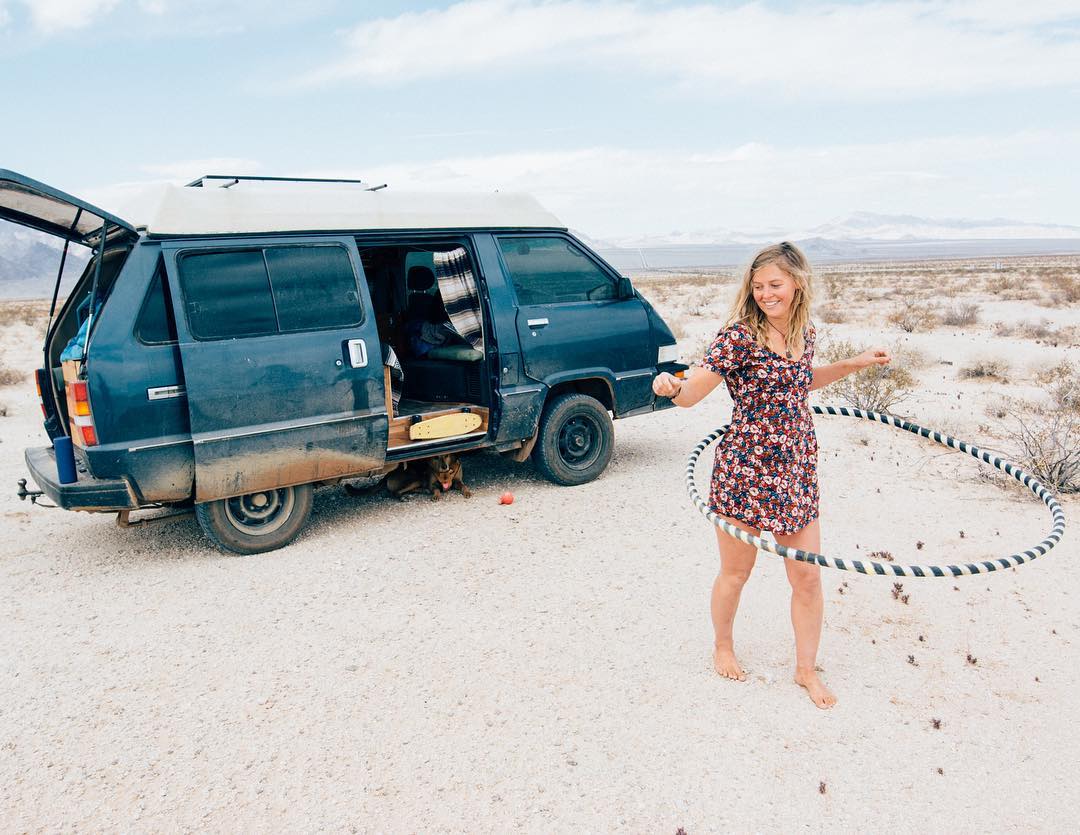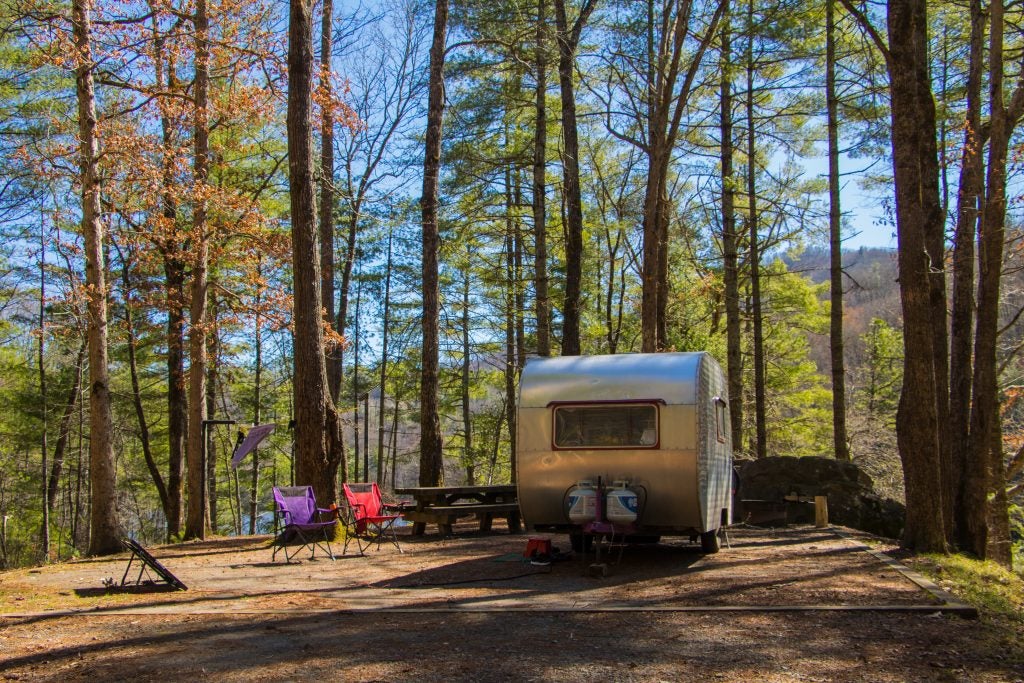If you scroll through the #VanLife hashtag on Instagram, a variety of patterns emerge. There are lots of vans on beaches and vans in deserts. There are lots of climbers and surfers. And there are lots of couples, cuddling beneath a Pendleton blanket with a dog at their side. Sometimes, it seems like everyone doing this #vanlife thing is part of a pair.
Kathleen lives and travels in her van. She has a trusty sidekick, Peaches (her dog), but otherwise, she’s typically traveling, living, and camping solo.
As a single woman myself who lives in her van (part-time), it’s refreshing to see someone who was making it work (full-time!).
Kathleen of @TinyHouseTinyFootprint is here to share what it’s like to live #vanlife solo, why she switched from a trailer to a van, and how the van community inspires her.
A Conversation with Solo Van-Lifer Kathleen of @TinyHouseTinyFootprint
The Dyrt: You’ve had a variety of minimal living arrangements. Can you give us a brief history of the tiny places you’ve lived in?
Kathleen: I’ve spent the past three years jumping around in different tiny spaces.
I started in a 1969 camper trailer that my former boyfriend, our two dogs and I lived in for almost two years. We worked full-time office jobs and lived in a family’s backyard.
As I transitioned into remote work, I thought van life would be a bit easier. I started in a 1987 Toyota van that we got from the owners of the land we were living on with the camper. Then I borrowed a 1978 postal van from some friends and now I own another 1987 Toyota van again.
What do you live in now?
I currently live out of a 1987 Toyota van that I built out with my friend Aaron who has a van conversion business in Colorado called Run Away Van.
The funny thing about this van in particular is that when I first saw it, I wasn’t planning on buying it and making it my own. I saw the post on Craigslist and recognized the van from a 1984-89 Toyota van Facebook group I was a part of. I was really geeking out about this van in particular because it had a pop top and that was rare to find on Toyota vans.
I really just wanted to meet the owner, Christian, and see the van in person. Seeing it for sale was an excuse to do that. But at the time, I wanted a bigger van. I thought I wanted something that would allow for me to have a kitchen inside and more space to move around. And when I saw the van in person, I still thought exactly that. But I asked Christian if I could take the van on some trips, take some photographs and help him sell it at a higher asking price.
Surprisingly, he agreed. And without hesitation, Christian handed me the keys and off I went. I took the van from Colorado to New Mexico and back and then California and back. And it was on the last trip that I fell in love with the van. And when I told Christian, he said he knew the entire time I would end up buying the van.
What is your travel schedule like? Are you usually on the road, or do you travel and stay put for awhile?
I really enjoy staying in one place for a few weeks at a time. I like to get to know an area by exploring it as much as I can and in return, I’m able to save money on gas and get more work done.
Some of my favorite locations are places where I can camp in national forest or BLM not far from a town or city. That way, I’m able to run into town to grab supplies, catch some Wi-Fi, but also get away from crowds and have my own little spot that I can camp at for free. Right now, I am hustling to make ends meet so I am working almost everyday. But it’s still worth it for me, because I’m able to work in beautiful locations and spend quality time with my dog, Peaches, in between.
What was your intention when you first started @tinyhousetinyfootprint?
Most people don’t know this, but I started the blog to journey my experiences living off the grid in a 1969 camper trailer while being a part of modern society.
My boyfriend and I did it for environmental reasons. We wanted to live more intentionally and be more conscious of how we were using resources like water and electricity and explore how we could compost our waste and food scraps. We wanted to remove our role as consumers of products and become more consumers of the land. And initially, we wanted to build a tiny house while we were living in the camper, so we saw the camper as a part-time living thing.
But as time went on, we learned more about tiny houses and realized it would cost a lot of money and we would have difficulties with legalities around finding a place to park it for long periods of time. So we scratched the idea of building a tiny house and decided the camper would do just fine.
One of the things I really struggled with in the beginning was finding community. I didn’t know anyone else living an alternative lifestyle like mine. So I started walking up to vans I would find on my travels and asking people if they were living in their vans full time.
I was also searching the #vanlife hashtag on Instagram and messaging everyone I could find. Surprisingly, it wasn’t easy. Most people were using a van on the weekends but very few were doing it full time.
But I slowly starting interviewing people and made a commitment to myself that I wouldn’t give up on my search. Now, I am backlogged on interviews and I can’t feature enough people in this community. It shows the growth of this movement and the power that we have to make something big through word of mouth and social media.
What initially attracted you to van life?
Van life offered a freedom that living in a camper trailer couldn’t provide.
For one, the camper was too big all around. It was big inside and it was big to park and just didn’t make sense as a mobile rig (at least in our minds). Van life was this goldilocks size of a rig that gave me crazy dreams of traveling and the excitement of being comfortable and uncomfortable at the same time. I was so eager to get in a van that I could barely wait to get started.
But it took me a long time to find the right van that was mechanically sound and built out with everything I needed in everyday living. I knew I wanted to live this way whether I was in a relationship or by myself. And I knew I had to be patient to find the rig that made sense for me and didn’t break down all the time.
What has been most surprising about living in a van, as opposed to living in other vehicles or small homes?
For me, vanlife is easier than living in a house or camper trailer. I think I was meant to live this way. I feel more comfortable when the mountains and canyons are my backyard instead of the bright lights and busy streets in a city.
I like showering in swimming holes and cooking in my outdoor kitchen. I like having the freedom to travel, but also be in one location for as long as I’d like. I love this community of nomads that I get to spend my time with whenever we happen to be in the same area.
It’s surprisingly easier because I’ve had the time to really explore what I need in this lifestyle. Like I said, it took three years to get here. It wasn’t always easy, but it gets easier and easier.
Breaking down in the middle of nowhere is always a fear of mine. What’s your worst breakdown story?
I have a few! I used to travel in vans that were prone to mechanical failure and I didn’t have the knowledge to take care of them.
I once broke down in the middle of nowhere Utah, without service. I was pretty scared and it was dark outside. An older couple pulled over to help me out and I had to immediately trust them.
We patched a hose that had a hole in it and it worked for a bit to get me into service before it broke down again. After that, I called a tow truck and got towed to a mechanic parking lot to wait until the morning to sort it out. It was a restless day and night but I survived and learned a lot about taking care of my van after that.
What’s it been like to share this lifestyle so publicly? Do you ever struggle with opening up on social media, and making yourself vulnerable to the opinions of others? What makes it worth doing?
I’m actually a rather private person and prefer to talk about other people rather than myself. I open up a lot about the struggles in this lifestyle, but I often get sick to my stomach thinking about how others might respond.
Negativity can eat you alive, but I try to focus on the positives as much as possible. I like being a connector and community builder. It gives me happiness to see more people feeling included in this lifestyle.
I also want to encourage others to think more about their impact on the environment and their responsibility as environmental stewards. The more “vanlifers” out there means the more people spending time and camping on public lands. While this is a great thing, it’s important to have proper education about public land use and what’s going on politically so we know how to advocate for what we believe in.
A lot of the top Instagram accounts for #vanlife seem to be couples. What has it been like transitioning to solo life on the road?
It hasn’t been easy to be a solo traveler to be honest. I enjoy being around people and would much rather share this experience with someone else.
But I’m not going to let that stop me from living my dream on my own. I think being single on the road is similar to being single in an apartment, except for the fact that I think it’s much more difficult to meet other single people when I’m constantly on the go.
It would be nice to have someone to help out in day-to-day tasks like cooking, taking care of Peaches or finding new places to explore.
I think being alone is a beautiful thing that we don’t give ourselves time for. In a city, it’s easy to find distractions that take you away from really being alone with yourself. But when you’re alone in nature, you’re able to have deep conversations with yourself and realize some things you normally wouldn’t allow yourself to give much thought. You become stronger and more able to tackle obstacles because you have no choice but to do it on your own.
[bctt tweet=”“In a city, it’s easy to find distractions that take you away from really being alone with yourself. But when you’re alone in nature, you’re able to have deep conversations with yourself…” – Kathleen of @tinyhousetinyfootprint ” username=”thedyrt”]
Do you run into concern from loved ones or strangers over your lifestyle? People seem to worry more about women who travel or live on their own. What do you say to them?
I would encourage more women to get out there and go for it. There’s always going to be reasons to not do something. There’s always going to be negative stories or ideas that people will put in your head. You can create any worst case scenario to lose sleep over. You can make yourself sick with worry and resist your fears. But things become more and more comfortable the more you do them.
There’s also a wonderful van life community that will support you. Even though everyone is in constant movement in this lifestyle, I’ve found amazing people that will have my back and look out for me in uncomfortable situations.
What’s been the biggest challenge of life on the road?
Mice! That’s my biggest fear. I am always worried they are going to find a way into my van. I take extra precautions to keep the van clean and food airtight to avoid them from sneaking in.
Of course, I also worry about my van occasionally not working properly. But I’ve gotten really good at diagnosing the van and I’m now able to take it to a mechanic and tell them exactly what I need to get done beforehand. It’s been beneficial to have that knowledge because I avoid getting overcharged and don’t waste as much time waiting around.
You probably get a lot of the same questions about going to the bathroom, taking showers, where to park, etc. What’s one question that people never or rarely ask and you wish they would?
I think what most people don’t realize is that this lifestyle is actually pretty hard, especially in an older rig. Most of the people I know in this lifestyle are barely getting by, trying to make money. We have to be creative with income and we hustle a lot.
Finding reliable Wi-Fi isn’t always easy when you’re also trying to camp for free and have beautiful views around you. You live this lifestyle to escape, but you have to work to fund your travels. It’s not always ideal.
[bctt tweet=”“You live this lifestyle to escape, but you have to work to fund your travels. It’s not always ideal.” – Kathleen of @Tinyhousetinyfootprint” username=”thedyrt”]
Do you ever long for a big, roomy house with a couch and a TV where you can spread out and invite friends over?
Never a TV. 🙂 But I do wish I had an open area that was enclosed where I could practice yoga when the weather isn’t great. Most of the time I can do that outdoors, but there are a few days where it’s raining or too cold and I wish I could escape somewhere and have a warm space. I get a little stir crazy in the van when the weather isn’t cooperating, but I get just as stir crazy in any space when I’m there for too long and not able to run around outside.
What’s one detail about your van that makes you feel cozy? What makes it feel like home?
Lights! It wasn’t until a few weeks ago that I had some lights added and it makes a huge difference. It feels like a mini apartment now that I can light it up and sit in there later at night without a headlamp or the flashlight on my phone.
What’s been the most valuable lesson you’ve learned since embracing the minimalist lifestyle in various forms?
[bctt tweet=”“If you get an opportunity to do something and it scares you, you should probably go do it! Life is too short to wish you were doing something else.” – Kathleen of @Tinyhousetinyfootprint” username=”thedyrt”]
Vanlife is not easy in the winter. It’s cold, it gets dark early, and you’re constantly trying to find new ways to stay warm. In a camper, I had a mini electric heater that kept me warm and I also had the luxury of standing up and cooking inside the kitchen and going to a bathroom indoors.
Also, if you get an opportunity to do something and it scares you, you should probably go do it! Life is too short to wish you were doing something else. Do it if you feel in your gut at all like you should.
The Dyrt is the only camping app with all of the public and private campgrounds, RV parks, and free camping locations in the United States. Download now for iOS and Android.
Popular Articles:
Articles on The Dyrt Magazine may contain links to affiliate websites. The Dyrt receives an affiliate commission for any purchases made by using such links at no additional cost to you the consumer.



